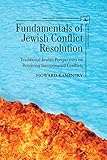Fundamentals of Jewish Conflict Resolution : Traditional Jewish Perspectives on Resolving Interpersonal Conflicts / Howard Kaminsky.
Material type: TextSeries: Studies in Orthodox JudaismPublisher: Boston, MA : Academic Studies Press, [2017]Copyright date: ©2017Description: 1 online resource (609 p.)Content type:
TextSeries: Studies in Orthodox JudaismPublisher: Boston, MA : Academic Studies Press, [2017]Copyright date: ©2017Description: 1 online resource (609 p.)Content type: - 9781618115638
- 9781618115645
- BJ1286.C65 K36 2017
- online - DeGruyter
- Issued also in print.
| Item type | Current library | Call number | URL | Status | Notes | Barcode | |
|---|---|---|---|---|---|---|---|
 eBook
eBook
|
Biblioteca "Angelicum" Pont. Univ. S.Tommaso d'Aquino Nuvola online | online - DeGruyter (Browse shelf(Opens below)) | Online access | Not for loan (Accesso limitato) | Accesso per gli utenti autorizzati / Access for authorized users | (dgr)9781618115645 |
Browsing Biblioteca "Angelicum" Pont. Univ. S.Tommaso d'Aquino shelves, Shelving location: Nuvola online Close shelf browser (Hides shelf browser)
Frontmatter -- Contents -- Detailed Table of Contents -- Acknowledgments -- Preface -- PART I. Introductory Essay -- Chapter 1: Contemporary Conflict Resolution: An Overview of the Field and the Core Components of its Educational Programs -- PART II. Foundational Values and Concepts -- Chapter 2: Pursuing Peace and Refraining from Destructive Conflict -- Chapter 3: Rabbinic Perspectives on Constructive Conflict: A "Dispute for the Sake of Heaven" -- PART III. Foundational Commandments And Laws -- Chapter 4: Basic Interpersonal Obligations and Prohibitions -- PART IV. Basic Commandments and Laws of Interpersonal Conflict Resolution -- Chapter 5: Judging People Favorably: Countering Negative Judgmental Biases -- Chapter 6: Tokhahah: Judaism's Basic Approach to Resolving Interpersonal Conflict through Dialogue -- Chapter 7: Retaliation and Resentment: Not Taking Revenge and Not Bearing a Grudge -- Chapter 8: Apologies: The Asking and Granting of Forgiveness -- PART V. The Affective Component-Anger Management -- Chapter 9: Jewish Anger Management -- Conclusion -- Glossary -- Bibliography -- Index
restricted access online access with authorization star
http://purl.org/coar/access_right/c_16ec
Fundamentals of Jewish Conflict Resolution offers an in-depth presentation of traditional Jewish approaches to interpersonal conflict resolution. It examines the underlying principles, prescriptive rules, and guidelines that are found in the Jewish tradition for the prevention, amelioration, and resolution of interpersonal conflicts, without the assistance of any type of third-party intermediary. Among the topics discussed are the obligations of pursuing peace and refraining from destructive conflict, Rabbinic perspectives on what constitutes constructive/destructive conflict, judging people favorably and countering negative judgmental biases, resolving conflict through dialogue, asking and granting forgiveness, and anger management. This work also includes detailed summaries of contemporary approaches to interpersonal conflict resolution, theories and research on apologies and forgiveness, and methods of anger management.
Issued also in print.
Mode of access: Internet via World Wide Web.
In English.
Description based on online resource; title from PDF title page (publisher's Web site, viewed 24. Aug 2021)









